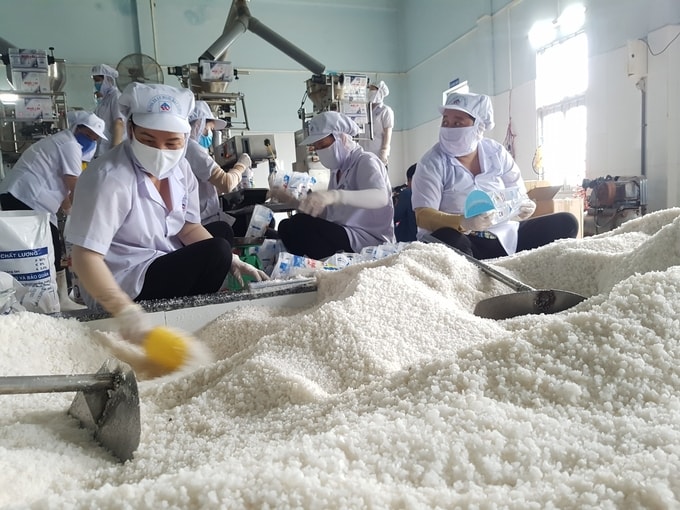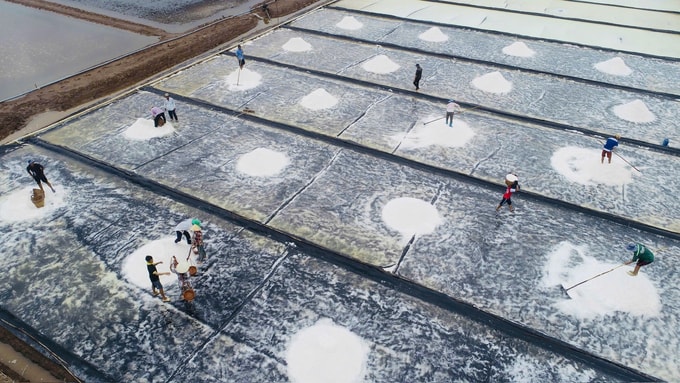
Đa giá trị sản phẩm từ muối
Thứ trưởng Bộ Nông nghiệp và Môi trường Võ Văn Hưng nhận định, tình hình biến đổi khí hậu và thời tiết cực đoan diễn ra sớm và ngày càng khốc liệt đã ảnh hưởng mạnh đến sản xuất muối, do trên đồng ruộng tỷ lệ cơ giới hóa thấp, thiếu kho chứa. Muối là ngành sản xuất lao động nặng nhọc nhưng thu nhập lại thấp, vì thế có sự cạnh tranh lao động giữa ngành muối với các ngành khác.
Theo Thứ trưởng Võ Văn Hưng, do thu nhập làm muối thấp, nên một số diêm dân bỏ ruộng không sản xuất tìm kiếm việc làm khác có thu nhập cao hơn. Chưa kể, hiện nay bình quân thu nhập của người làm muối mới đạt gần 40 triệu đồng/năm, chỉ bằng 70% mức thu nhập trung bình cả nước.

Thứ trưởng Bộ Nông nghiệp và Môi trường Võ Văn Hưng, đánh giá cao những nỗ lực của tỉnh Bạc Liêu trong việc gìn giữ và phát huy giá trị hạt muối trong thời gian qua. Đồng thời, khẳng định thời gian tới, Bộ Nông nghiệp và Môi trường sẽ tập trung nâng cao sản lượng, chất lượng, đa dạng hóa sản phẩm, đẩy mạnh sản xuất, chế biến, tiêu thụ muối trong nước.
Đầu tư phát triển sản xuất muối ở những khu vực có điều kiện tự nhiên thuận lợi theo hướng tập trung, quy mô lớn. Hình thành vùng sản xuất muối công nghiệp với công nghệ hiện đại, gắn sản xuất với chế biến, thu hồi các sản phẩm sau muối và các ngành kinh tế khác như du lịch nông thôn và dịch vụ chăm sóc sức khỏe, làm đẹp.
Phát triển ngành muối đồng bộ các lĩnh vực sản xuất, chế biến, bảo quản và tiêu thụ muối. Gắn chuyển dịch cơ cấu sản xuất muối với đổi mới công nghệ. Đầu tư nâng cấp cơ sở hạ tầng đồng muối để nâng cao năng suất, chất lượng và hiệu quả trên đơn vị diện tích. Đảm bảo sinh kế, nâng cao thu nhập cho diêm dân, tiến tới làm giàu bằng nghề muối.
Cần thêm cơ chế chính sách hỗ trợ đầu tư phát triển nghề muối
Chủ tịch UBND tỉnh Bạc Liêu Phạm Văn Thiều nhận định, nghề muối đã và đang phải đối mặt với nhiều thách thức. Biến đổi khí hậu làm ảnh hưởng đến năng suất, chất lượng muối, các yếu tố cạnh tranh thị trường làm cho giá muối rất bấp bênh, thường xuyên xuống thấp. Thu nhập từ nghề làm muối kém hơn so với những nghề khác, ảnh hưởng đến công tác gìn giữ, bảo tồn nghề làm muối truyền thống của Bạc Liêu.
Do đó, đòi hỏi sự quan tâm, đầu tư của các cấp, các ngành để hỗ trợ cho nghề muối hướng đến đa dạng hóa sản phẩm, không chỉ là muối ăn mà còn là muối làm đẹp, muối chữa bệnh, muối phục vụ sản xuất công nghiệp.
Theo báo cáo của Bộ Nông nghiệp và Môi trường, sau khi Chính phủ ban hành Nghị định số 40/2017/NĐ-CP về quản lý sản xuất, kinh doanh muối, Bộ đã chủ động phối hợp với các Bộ, ngành, địa phương triển khai nhiều giải pháp thực hiện tốt chức năng quản lý nhà nước về sản xuất, chế biến, kinh doanh muối. Đồng thời, xây dựng, ban hành cơ chế, chính sách, quy định mức chi và bố trí nguồn vốn từ ngân sách địa phương hằng năm để hỗ trợ đầu tư phát triển sản xuất muối.

Sản lượng muối bình quân giai đoạn 2017 - 2024 đạt trung bình gần 1 triệu tấn/năm. Lao động sản xuất muối trung bình giai đoạn 2017 - 2020 là 41.247 người, đến năm 2024 giảm còn khoảng 19.000 người.
Về phương pháp sản xuất, cả nước hiện có 19 tỉnh, thành phố, gồm 40 huyện, 116 xã có nghề sản xuất muối. Trong đó, miền Bắc 5 tỉnh, miền Trung 7 tỉnh và Nam Bộ 7 tỉnh.
Hiện nay, toàn quốc có 73 cơ sở chế biến muối thuộc mọi thành phần kinh tế tham gia sản xuất muối tinh, muối trộn i-ốt, muối sạch xuất khẩu... Trong đó, 13 cơ sở chế biến muối đã đầu tư ứng dụng các tiến bộ khoa học kỹ thuật, công suất 15.000 - 22.000 tấn/năm và 1 cơ sở đã đầu tư 2 dây chuyền thiết bị đồng bộ nhập khẩu của Tây Ban Nha có công suất 200.000 tấn/năm.

Trong đó, sản phẩm muối đa dạng nhất là sản phẩm dùng trong ăn uống, thực phẩm. Sản phẩm muối của một số địa phương đã xuất khẩu sang châu Âu, Mỹ, Nhật Bản, Hàn Quốc… và xây dựng được kênh phân phối tại các siêu thị lớn như: BigC, Copmak, Vinmart, hệ thống bán lẻ Bách Hóa Xanh.
Riêng tại Bạc Liêu, với diện tích sản xuất gần 1.400 ha cho sản lượng gần 80.000 tấn/năm. Trong 160 sản phẩm OCOP của tỉnh có nhiều sản phẩm trực tiếp liên quan đến muối.
Nguồn: https://baotainguyenmoitruong.vn/da-gia-tri-san-pham-tu-muoi-de-nang-cao-doi-song-diem-dan-387390.html








































Comment (0)